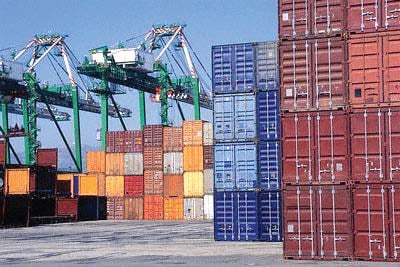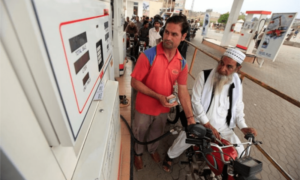ISLAMABAD:
The government has temporarily halted satellite tracking of containers carrying imported goods to Afghanistan from seaports and instead begun monitoring them through human surveillancea move that may increase the chances of smuggling.
After withdrawing the license of a company that had been tracking container movements through GSM and satellite since 2013, last week, the Federal Board of Revenue (FBR) handed over the task to four firms. These firms were selected based on four-year-old technical qualifications and without any competitive process, according to official documents.
In a written statement, FBR Director General for Transit Trade Mohsin Rafique confirmed that four firms have been “authorised regarding tracking of the cargo by the Licensing Committee, as these companies were already technically evaluated and found eligible by the Licensing Committee in its meeting dated April 6, 2021.” These firms, however, lack experience in container tracking and do not have Container Surveillance Devices (CSDs), the FBR admitted in a written response to The Express Tribune. Their technical capability is limited to installing tracking devices on vehicles rather than containers.
The FBR’s shift from satellite tracking to a human-driven model has raised eyebrows. On December 27, the FBR issued new standard operating procedures (SOPs) for bonded cargo movement.
The SOPs state, “The Collectorate of Customs Enforcement, Karachi, shall provide additional human resources as required by the Director, Directorate of Transit Trade, to carry out interim monitoring at origin.” Similar instructions were issued to Customs offices along the transit route.
The FBR abruptly terminated TPL Trakker’s license, without first putting in place an equally effective alternative to mitigate smuggling risks, sources said.
Last month, the FBR issued Statutory Regulatory Order 2051 to relax the financial health and tracking expertise requirements for contractors. The new companies, assigned to monitor the transportation of goods to Afghanistan and within the country, have experience and gadgets only for vehicle tracking.
While Prime Mover Devices (PMDs) installed on vehicles can monitor their movement, they do not track containers themselves. To prevent pilferage, a separate CSD is typically installed on container doorsa capability the new contractors lack.
During a Licensing Committee meeting on December 31, the newly selected firms admitted they only had PMDs readily available. Nevertheless, the committee allowed them to establish control rooms at the Old Custom House in Karachi and begin interim tracking operations. “No [newly selected] company has expertise in container tracking, and only M/s TPL was doing container tracking in the market,” the DG Transit Trade confirmed. He added that “CSD is an expensive device which is not available with any company other than TPL.”
Rafique stated that a shortage of CSD devices exists in the country, and their use will resume once they are available. The FBR also amended Customs rules to change the criteria for awarding tracking licenses, delegating the authority from the FBR Board to a Licensing Committee. Advertisements were issued by the FBR to select new firms, and nine companies expressed interest. The financial eligibility criteria were reduced: the turnover requirement dropped from Rs175 million to Rs100 million, and the financial worth requirement decreased from Rs100 million to Rs75 million. The DG said that these changes were made to encourage more companies for container tracking. Rafique added that the container-tracking experience requirement was removed since local tracking firms typically only monitor vehicles.
Transporters have protested the FBR’s decision, citing increased costs. They are now required to pay Rs20,000 to install PMDs on vehicles and Rs5,278 per trip to the new contractors. To mitigate risks, the DG said, the FBR has implemented measures such as scanning cargo at ports of origin and destination, centralised real-time monitoring, and convoy movements under Customs escorts. Rafique stated that the Licensing Committee has terminated the license of TPL Trakker with effect from December end on “TPL’s inability to perform the live satellite tracking of enroute cargo and its operation remained halted due to their IT issues, without them having backup plan for tracking of the cargo”.
TPL has denied the FBR’s claims of non-performance. The company said its IT system was down only between June 13 and June 19, 2024, due to a cyberattack, but has since been fully restored. It also refuted allegations of inadequate satellite tracking, stating it used hybrid devices with both GSM and satellite capabilities.











